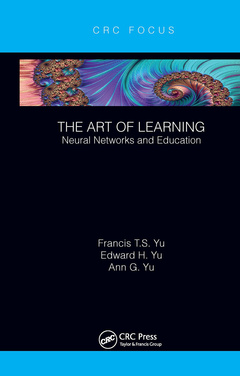The Art of Learning Neural Networks and Education
Auteurs : Yu Francis T.S., Yu Edward H., Yu Ann G.

This book presents the idea that innovative ways of teaching and learning are very essential to retention and growth. Presented in 15 sections, the book starts with the common sense training on education and moves on to neural network operation. Throughout the book, the art of learning, associative, cognitive, and creative learning are stated and defined. Learning simplicity, information content as related to neural network learning are discussed. The author also discusses neural plasticity and adaptability in smarter neural networks.
If we know our human brain?s basic abilities and limitation then a better educational methods can be implemented.
- Presents the idea that innovative ways of teaching and learning are very essential to retention and growth
- Discusses major differences and constraints between neural network and computer
- Presents the significances of learning simplicity and information content as related to neural network learning are included
- Stresses the neural network learning capabilities and limitations and their role in developing more efficient learning techniques
Francis T. S. Yu received his B.S.E.E. degree from Mapua Institute of
Technology Manila, Philippines, and his M.S. and Ph.D. degrees in
Electrical Engineering from the University of Michigan. He has been a
consultant to several industrial and governmental laboratories. He is an
active researcher in the fields of optical signal processing, holography,
information optics, optical computing, neural networks, photorefractive
optics, fiber sensors, and photonic devices. He has published over five
hundred papers, in which over three hundred are referred. He is a
recipient of the 1983 Faculty Scholar Medal for Outstanding Achievement
in Physical Sciences and Engineering, a recipient of the 1984
Outstanding Researcher in the College of Engineering, was named Evan
Pugh Professor of Electrical Engineering in 1985 at Penn State, a
recipient of the 1993 Premier Research Award from the Penn State
Engineering Society, was named Honorary Professor in Nankai University
in 1995, is the corecipient of the 1998 IEEE Donald G. Fink
Prize Paper Award, was named Honorary Professor of the National
Chiao-Tung University in Taiwan, and is the recipient of the SPIE 2004
Dennis Garbor Award. He has served as an associate editor editorial
board member, and a guest editor for various international journals. He
is the author and coauthor of nine books. Dr. Yu is a life fellow of IEEE
and a fellow of OSA, SPIE, and PSC.
Edward H. Yu is a teacher, writer, and the author of The Art of
Slowing Down: A Sense-Able Approach to Running Faster(Panenthea
Press) and The Mass Psychology of Fittism: Fitness, Evolution & the
First Two Laws of Thermodynamics (Undocumented Worker Press).
Date de parution : 06-2024
13.8x21.6 cm
Date de parution : 09-2018
13.8x21.6 cm
Thèmes de The Art of Learning :
Mots-clés :
Central Processing Unit; Neural networks and learning; Vice Versa; Leadership; Biological Neural Networks; Brain Plasticity; Extra Large; Associative Memory; Overburden; Artificial Neuron Operation; Visual Spatial Learners; lifelong learning; Swiss Patent Office; Edward H; Yu; Animal Kingdom; Ann G; Yu; Air Force; Arabian Horse; Night Vision Devices; Ceo; Chief Executive Officers; Associative Learning Rules; Dumb Jock; Hubble Space Telescope; UL; Coherence Theory; Mindless Machines; Air Force Academies; SL
Ces ouvrages sont susceptibles de vous intéresser

Deep Learning with R 94,94 €


